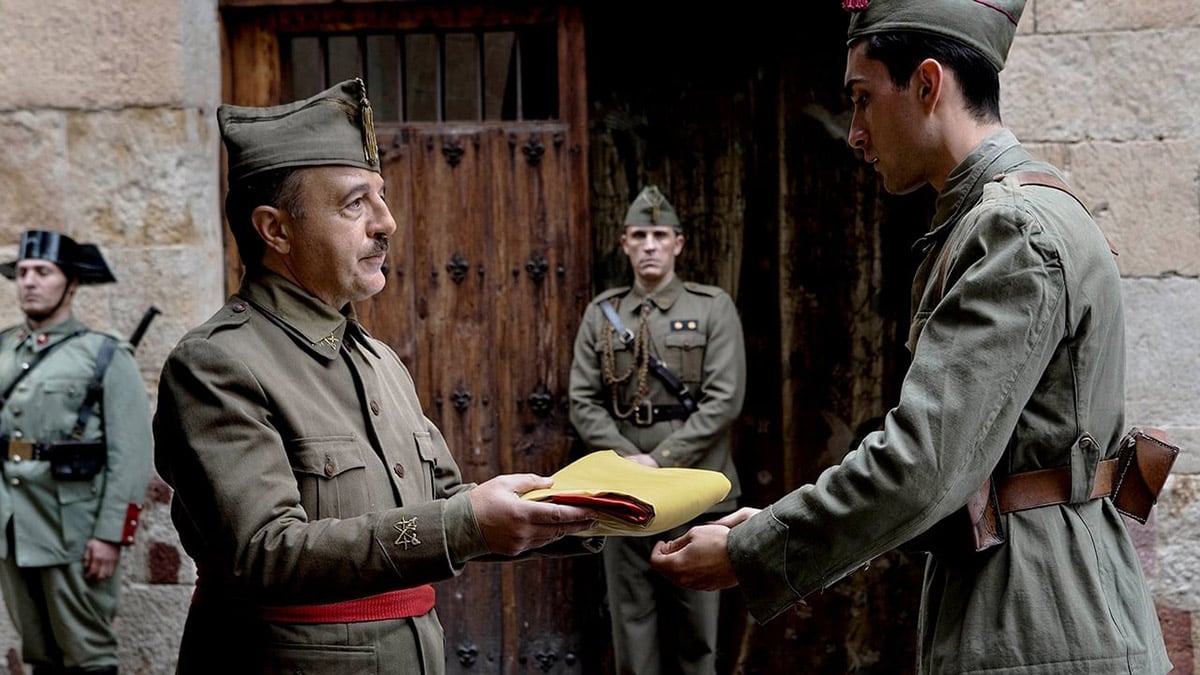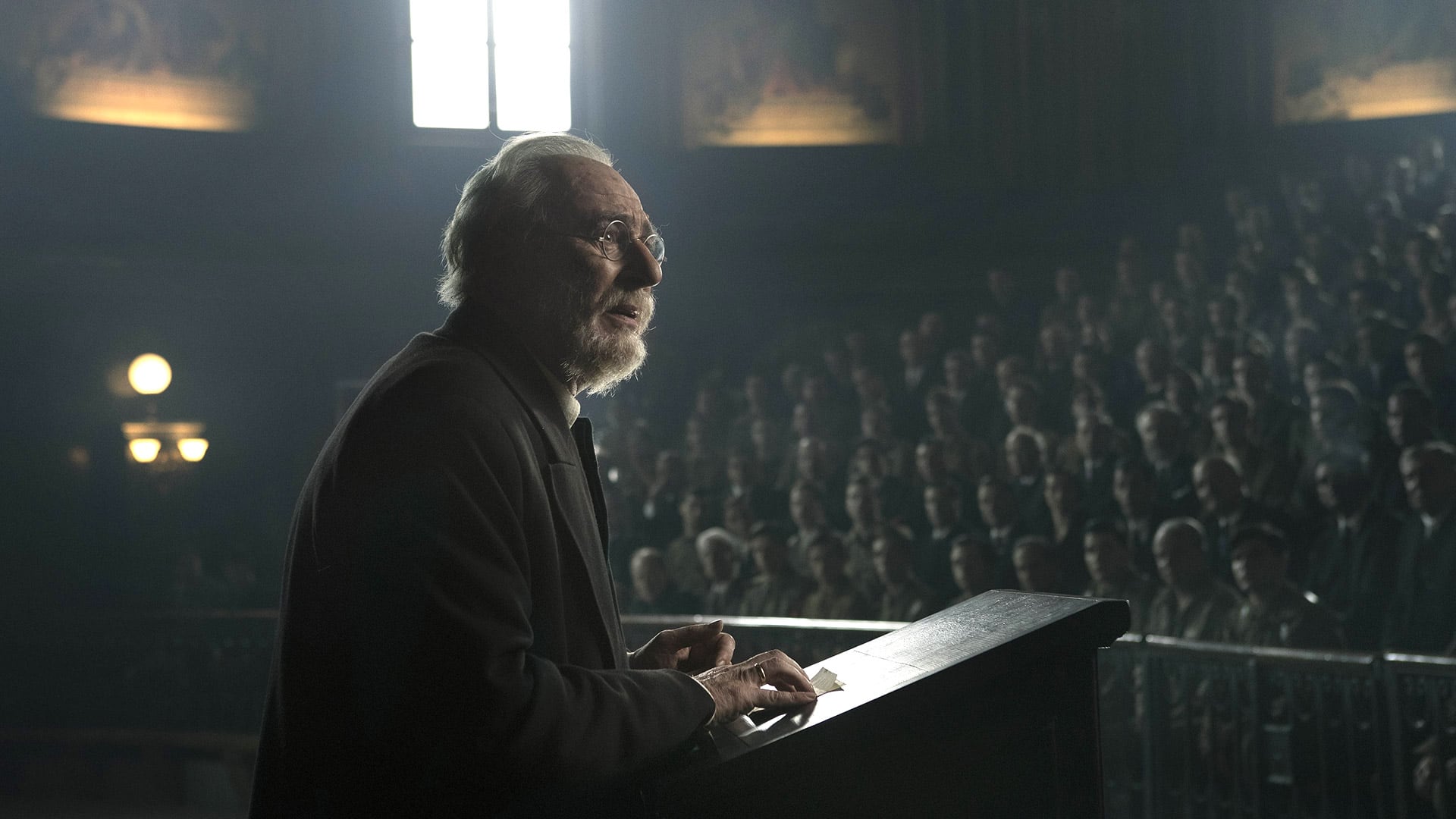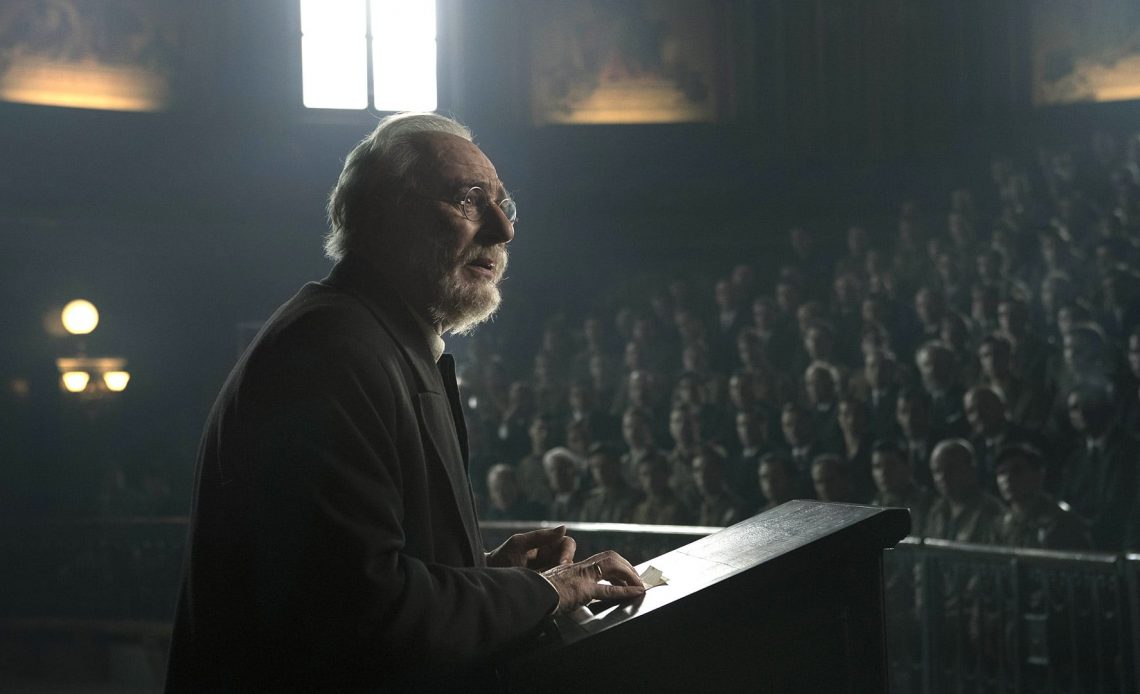While At War is a lyrical and symbolic meditation of the Spanish philosopher and writer Miguel de Unamuno that speaks directly to a modern audience, warning against the dangers of political apathy, fascism, and ambiguity.
In the summer of 1936, famed Spanish writer and philosopher Miguel de Unamuno publicly supports the military rebellion, believing it will bring order to chaos in Spain. He loses his job and influence in a left-wing university. Meanwhile, General Francisco Franco initiates a successful campaign from the South, secretly plotting to take over the country. As the war escalates, Unamuno must question his loyalties and reconsider his principles.
While at War is ambitious in scope and delivery, and the narrative is poignant. Unamuno is a frail, educated older man witnessing the world around him devolve into a strange new world. There’s a seriousness that hangs over this film, a warning paralleling our times, representing Spanish and global politics, that draws you in from the start. However, not all of the dramatic possibilities and concerns of the film are fully fleshed out, though that’s not always a bad thing. Sometimes it’s better to leave the audience wanting more.

Unusual for most political films in this ideologue world, While at War deals with actual political and historical events with a balanced approach towards the left and right wings and sheds light on the Spanish civil war. There’s an all too obvious warning in this film: beware of political leaders that start off being a bit of a joke and soon become tyrannical and lead their countries into disarray. This film also talks about how compassion and dialogue are fragile virtues that almost seem to be extinct in contemporary public life.
The audience painfully learns these lessons via the film’s protagonist, the aging philosopher, essayist, poet and playwright Miguel de Unamuno (whose actual life this film briefly charts). Soon after the start of the Spanish Civil War, Unamuno (Karra Elejalde) made a legendary speech at the University of Salamanca, warning the Francoist Nationalist forces in the audience that they could “Vencer, pero no convencer”, ie. “Win, but not convince”. Following that speech, Unamuno suffered great public humiliation.

The film opens with a boisterous and patriotic fluttering of the flag of Spain’s Second Republic. A beautiful and raw staged opening scene set in July 1936 shows Nationalist troops moving into the square of the cathedral city of Salamanca to declare a state of war before arresting the city’s mayor for the crime of being Republican. Awakened by the sounds of gunfire, the elderly Unamuno, the former rector of Salamanca University, dons his trademark beret and heads out to meet up with Protestant priest Atilano (Luis Zahera) and his young Marxist protege Salvador (Carlos Serrano-Clark). Along with Unamuno’s daughter Felisa (Inma Cuevas), Salvador is adamant that fascism is on its way, but Unamuno is sceptical.
In Morocco, more danger lurks. Francisco Franco (Santi Prego) is preparing his entrance into Spain to support the coup, aided by the Germans, and all hell breaks loose. This second narrative strand charts the establishment of Franco as the Nationalist leader, accompanied by his faithful and murderous disciple, Millán de Astray (Eduard Fernandez): the populist, one-armed, one-eyed character who founded the Spanish Foreign Legion, who revels in his nickname of “the Mutilated”.

In reality and in the film, it’s de Astray who shouts the famous line “Death to intellectuals” during Unamuno’s final speech. Fernandez relishes the character and chews up the scenery. He plays de Astray well and is in complete control, never allowing his portrayal to fall into farce. Much like Hitler, Francisco Franco is a complicated character to portray convincingly. And, like Hitler or Stalin, the portrayal of Franco in film tends to so often fall towards caricature. Tyrants are usually dull little men with shrill, high-pitched voices. Prego plays Franco in a nuanced and controlled way, commanding the character so that he’s able to twist the dullness into creepiness, making your skin crawl.
The movie also deals with many compelling historical facts, suggesting that Franco may have been behind the plane crash that coincidentally killed two of his rivals as Nationalist leader. However, this episode doesn’t receive much screen time, just a few furtive glances between Franco and his politician brother. To this extent, While at War holds up to historical scrutiny, which many Hollywood films about the same era cannot claim.

Like most historical military dramas, there are plenty of composite characters, unknown men in uniform, whose backgrounds are not fully fleshed out. Sadly, this too is true for Unamuno’s backstory. If you were not aware of who Unamuno was, it could seem a bit jarring as to why he is so vital and powerful. The script appears restrained; there are so many elements hovering around the characters that it seems strange not to take full advantage of them. The old philosopher is a compelling character, fuelled by intellectual arrogance, the romance of patriotism, and innocence.
Everyone around Unamuno keeps reminding him that times have changed. Many of his friends accuse him of complicity in the Nationalist cause. In contrast, while his friends are dragged off to be executed, Unamuno still refuses to believe the painfully clear evidence confronting him. Despite Elejalde’s performance, the character’s stubbornness falls into the dithering old-fool trope too quickly, which causes his character to be distant and wholeheartedly frustrating.
The women in the narrative are secondary characters but are more nuanced and more pragmatic to what’s going on around them. They’re nowhere near as power-mad as the men. This is where the film’s main point is made, especially with Carmen Franco (Mireia Rey), the dictator’s wife. There’s a moral ambiguity to her; the division between good and evil is seldom as simple as black and white.

The primary location for the film is the beautiful city of Salamanca. Alex Catalan’s photography makes the city come alive as its own character and not just the backdrop for the film. The light and the composition is naturalistic with a rich tone. There are several beautifully composed and lit shots. One of the highlights has to be the scene where Unamuno and Salvador are furiously arguing, their figures in silhouette with the sun retreating in the background. The not-so-subtle point being made is that as long as people are still listening to one another, maybe there’s still hope despite their differences. The scene is even more poignant when you consider that two months after this famous speech, Unamuno was dead.
Overall, While at War is entertaining and, from all reports, historically accurate, but is lacking in character development, really bringing the film down. Otherwise, this film could have been a masterpiece and a reminder of just how important dialogue and understanding is.
Fun Fact:
An important part of the movie is set in the town of Salamanca, being the Main or Major Square (Plaza Mayor). It was actually shot in that very square, although the vegetation shown had to be added as in the moment of shooting, the square had none.




COMMENTS